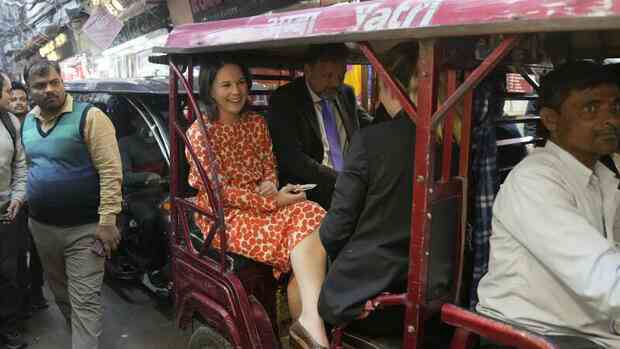Bangkok Foreign Minister Annalena Baerbock sees India as an important value partner for Germany, despite its extensive oil deals with Russia. On her first visit to New Delhi since taking office, Baerbock announced stronger political and economic cooperation with the country on Monday – including facilitating the immigration of Indian skilled workers.
“We can grow closer together as value partners and are already doing so,” said Baerbock at a joint press conference with her Indian counterpart Subrahmanyam Jaishankar. The difficult world situation makes this necessary.
Baerbock left largely unmentioned differences with regard to the rapid expansion of Indian oil imports from Russia since the beginning of the Ukraine war – she only spoke of “slight nuances” in the different perspectives.
Indian officials meanwhile stressed that they intend to continue energy deals with Russia despite the EU price cap on Russian oil that came into force on Monday.
India, which used to import only small amounts of crude oil from Russia, became the largest buyer after China after the war began – and is therefore faced with the accusation of supporting Russia and weakening the effects of Western sanctions.
India complains about rising prices due to Europe’s energy policy
Foreign Minister Jaishankar defended India’s stance: “I understand that there is a conflict in Europe and that Europe has its perspective on it,” he said after his meeting with Baerbock. Since the beginning of the war, however, the European Union has imported significantly more fossil fuels from Russia than India has done.
“Like visiting a good friend.”
(Photo: dpa)
With that in mind, he said Europe cannot prioritize its own energy supplies on the one hand and ask India to do the opposite on the other. Jaishankar also complained that Europe’s increased energy imports from the Middle East led to rising prices for India.
>> Also read here: The consequences of the oil price cap and oil embargo
India depends on imports for 85 percent of its crude oil needs. Russia replaced Saudi Arabia as the second most important supplier this year. From the point of view of the government in New Delhi, the price cap of 60 dollars per barrel of oil set by the EU and other allied states will not change anything fundamental.
EU shipping companies and insurers are only allowed to participate in Russian crude oil deals if the oil is sold below or at the upper price limit. But in recent months Russia has built up a tanker fleet that is not affected by the sanctions – and can continue to deliver to India and China. In addition, India is apparently willing to accept Russian insurance for business.
New Delhi sees itself as well-equipped to stick to the energy partnership with Russia: “India need not fear that the West’s price cap could impede the flow of Russian oil,” said India’s Oil Minister Hardeep Singh Puri in an am Interview broadcast Monday. “I’m not worried about that and I’m sure the market will handle it.”
According to industry observers, one reason why the upper price limit in India is unlikely to be noticeable for the time being is the significant price reduction that Russia recently granted anyway: According to the Indian media and the financial service Bloomberg, this led to Indian refineries using Russian oil below the 60- Dollar stamp could acquire.
New Delhi wants easier access to Russia’s market
Foreign Minister Jaishankar also admitted in the presence of his visitor from Germany that India also wants to expand trade with Russia in other areas. A list of categories of goods for which India would like easier access to the Russian market was sent to Moscow.
Baking in a kitchen in Old Delhi.
(Photo: AP)
Foreign Minister Baerbock apparently does not see this as an obstacle to German relations with India, which the federal government wants to intensify, also because of the rivalry with China. She gushed that her trip to India was “like visiting a good friend”. She used the familiar name of her counterpart Jaishankar several times at the press conference.
>> Also read here: China’s crisis is India’s opportunity: Both have close ties to Moscow – but with one big difference
With regard to India’s presidency of the G20 group of states, she emphasized that India is now assuming “global responsibility”. Before her departure, Baerbock had already praised India’s diplomacy: “The clearer positioning of the G20 against the Russian war of aggression in Ukraine is ultimately also due to India,” she said.
She has agreed a so-called mobility partnership with Jaishankar, which should make it easier for Indians to work, study or do an apprenticeship in Germany. “We want highly qualified professionals and young people from India to come to Germany,” said Baerbock.
People in India have often heard such announcements from Germany in the past, but in practice they often got a different impression: Months of delays in issuing visas have recently caused trouble again and again. Baerbock promised to work on it: she wanted to reduce the bureaucracy and reduce waiting times.
More: China’s crisis is India’s opportunity: Both have close ties to Moscow – but with one big difference
